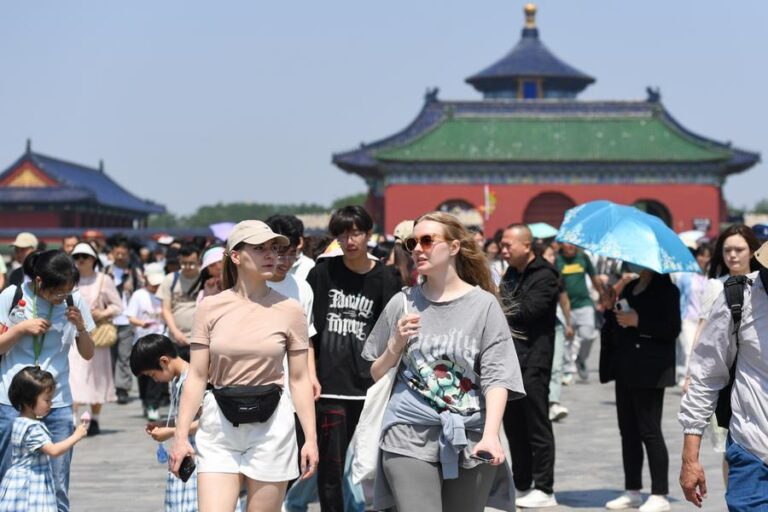“This time when I went to China I had something special – a visa-free passport,” Lucas Dekkers, a Belgian man in his 20s, wrote on Chinese video-sharing platform Douyin, along with a photo of himself waving the wine-red travel document.
Since the beginning of this year, China has implemented a time-consuming and costly visa-exemption policy for many European ordinary passport holders, encouraging travelers from more than a dozen European countries to visit the Asian country.
Moreover, Chinese President Xi Jinping announced last week during his first European visit in nearly five years that the country had decided to extend visa exemptions for citizens of 12 countries, 11 of which are European, for short-term visits to China until the end of 2025.
The policy, aimed at promoting exchanges between Chinese people and international citizens, has been widely praised in Europe and is expected to improve Sino-European relations in many ways.

Tourists visit the Temple of Heaven in Beijing, China, on May 2, 2024. [Photo/Xinhua]
Wider door opening
The extension policy allows ordinary passport holders from France, Germany, Italy, the Netherlands, Spain, Malaysia, Switzerland, Ireland, Hungary, Austria, Belgium and Luxembourg to enter and stay in China visa-free for up to 15 days for business, tourism, visiting relatives and friends, and transit purposes.
Hungary’s Foreign Affairs and Trade Minister Peter Szijjártó said in a social media post that the visa-free policy was “good news” for Hungarian tourists and business travellers heading to China.
He further said that as a matter of reciprocity, Hungarian authorities are already issuing long-term visas to managers of major Chinese companies investing in Hungary upon their first application.
These decisions will further strengthen cooperation between Hungary and China in the fields of economy and tourism, the diplomat noted.
Mario Boselli, president of the Italy-China Council Foundation, said the new visa-free policy shows that China’s doors are opening wider and will boost economic, trade and cultural exchanges between the two countries.
The visa-free policy for Spanish nationals is an “important milestone” in bilateral relations, said Jose Felix Valdivieso, director of IE University’s China Center, which aims to promote education and business cooperation between the two countries.
“It will increase people-to-people exchanges between China and Spain, enriching our societies with diverse perspectives and experiences,” Valdivieso said, calling the move “a catalyst for further growth and cooperation.”
Revitalization of the tourism industry
This policy made it easy for French panda enthusiast Jérôme Pouille to arrange a trip to China this spring to visit Yuanmeng, the first giant panda born in France, who was returned to China’s Chengdu Research Base of Giant Panda Breeding last July.
Seeing Yuan Meng living happily in his hometown, Pouille felt “happy and satisfied.”
European travel operators see the visa-free policy as a boost to tourism, as it encourages many European travellers to embark on expeditions across China.
Günter Gruber, senior consultant at Austrian travel agency KUONI, said he was very pleased that China had introduced the 15-day visa-free policy for Austria.
“China has always been one of the most visited tourist destinations for Austrians. We are currently planning travel plans for spring and summer 2025 and will launch further travel products relating to China,” Gruber said.
For many Europeans, visiting China is complicated: you have to plan ahead, manage your finances and set aside time in advance.
“It’s great if you don’t have to worry about visa issues. It’s very helpful,” said Davide Kuegl, senior manager at the Geneva Tourism and Convention Foundation, Switzerland’s tourism promotion association.
According to the Geneva office of Air China, China’s national airline, after the visa exemption, there are an average of 50 Swiss tourists on board a Geneva-Beijing flight, making up around 25% of all passengers.
According to Air China statistics, a total of 6,364 passengers traveled between Geneva and Beijing in March 2024, up 374.9% from the previous year.
China’s visa-free policy for European countries and a recovery in Chinese outbound travel will be positive for global trade in services, according to Ralph Ossa, chief economist at the World Trade Organization.
Tourists pick cherry blossoms at a cherry blossom orchard in Taishan village, Hangzhou city, eastern China’s Zhejiang province, on April 24, 2024. [Photo/Xinhua]
A bridge for communication
Just two weeks after the policy came into effect, the Chinese Language Cultural Center in Luxembourg organized a spring training camp to visit China over the Easter holidays in April.
More than 20 Luxembourg students visited Beijing, Shanghai and other parts of China, some of whom joined the camp just a few days before departure as the visa exemption policy made travel easier.
“This travel promotion measure will encourage more Luxembourg nationals to visit China and help strengthen people-to-people and commercial exchanges between the two countries,” Luxembourg Deputy Prime Minister Xavier Bettel said in a statement.
The visa waiver policy is a concrete move by China to promote a high level of opening up and has given impetus to exchanges between China and Europe.
During his state visit to China in April, German Chancellor Olaf Scholz said the German side appreciates China’s visa-free entry policy for Germany and hopes to make it more convenient for Chinese nationals to visit Germany.
Ernst Wohler, president of the Vienna state parliament, said the policy had received an enthusiastic response from all walks of life in Austria.
“This measure will certainly facilitate travel to China for Austrian citizens, enhance people-to-people exchanges between the two countries, and further promote Austria-China relations and exchanges between the two countries,” Voller said.
According to China’s National Immigration Administration (NIA), in the first quarter of 2024, China’s immigration authorities handled more than 141 million traveller journeys, of which foreign travel reached 13.1 million, up 305.2% year-on-year.
“The visa waiver policy not only simplifies entry and exit, but also symbolizes China being more welcoming to foreign travelers,” said Dekkers, who is already a Mandarin-speaking influencer on Douyin, the Chinese version of TikTok.


